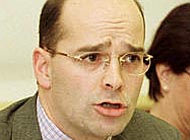Liechtenstein protests at blacklisting over money laundering

Switzerland's tiny neighbour Liechtenstein has protested at being placed on a blacklist by the international body responsible for combating money laundering.
The principality rejected criticisms that it was obstructing efforts to stamp out the crime. Liechtenstein’s prime minister, Mario Frick, said the government felt it had been “falsely judged”, by the Financial Action Task Force (FATF).
His comments come a day after the FATF criticised Liechtenstein, along with 14 other countries, for being uncooperative in international efforts to tackle money laundering.
Frick said Liechtenstein supported the FATF, and said it was doing all it could to support efforts to stamp out money laundering.
Liechtenstein was one of 29 countries assessed by the FATF to determine whether they satisfied a list of 25 criteria deemed necessary to combat money laundering. Switzerland was assessed, too, but was found to have made sufficient progress.
Mark Pieth, a Swiss expert on money laundering at the Organisation for Economic Cooperation and Development (OECD), says Liechtenstein is debating reforms to its banking laws, but he claims it still has a “very hesitant attitude in co-operating in legal and administrative matters”.
Pieth believes the blacklist will encourage Liechtenstein to be more cooperative. But he warns that, if it were to persist in being obstructive, “there are some very tough sanctions that could be applied and these would lead to a kind of marginalisation of Liechtenstein”.
Large financial centres could block the re-transfer of funds, which would deter people from investing in Liechtenstein because of fears that they may have difficulty moving their money in and out of the country.
The other 14 countries which could face similar penalties include: the Bahamas, the Cayman Islands, the Cook Islands, Dominica, Israel, Lebanon, the Marshall Islands, Nauru, Niue, Panama, the Philippines, Russia, St Kitts and Nevis, and St Vincent and the Grenadines.
At the moment, these countries are taking most of the heat for banking secrecy. But the issue is almost certain to return to haunt Switzerland.
Earlier this week, a European Union agreement on capital gains tax hinted that Switzerland would have to scrap its own banking secrecy laws, if the country is to join the EU.
But observers believe the pressure will start before talks on Swiss membership begin. Mark Pieth says that: “if the wider world is ready to take action against Liechtenstein, which has a customs and currency union with the Switzerland, the Swiss have to consider the possibility that they too may face similar pressures.”
Rudolf Strahm, finance spokesman for the Swiss Social Democratic Party agrees: “In the long run, the EU will not tolerate a tax haven on this continent. I think sooner or later, banking secrecy will be terminated.”
But banking secrecy has powerful backers in Switzerland, and not only among self-interested banks. The government believes there is strong public support for it – so strong, in fact, that the finance minister, Kaspar Villiger, thinks that a referendum calling for it to be scraped would fail. “I don’t see any chance that the Swiss people would abandon banking secrecy, and the issue would have to go to a vote. It’s an element of our culture.”
swissinfo with agencies

In compliance with the JTI standards
More: SWI swissinfo.ch certified by the Journalism Trust Initiative
You can find an overview of ongoing debates with our journalists here . Please join us!
If you want to start a conversation about a topic raised in this article or want to report factual errors, email us at english@swissinfo.ch.